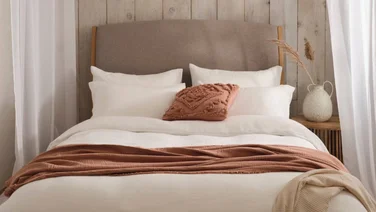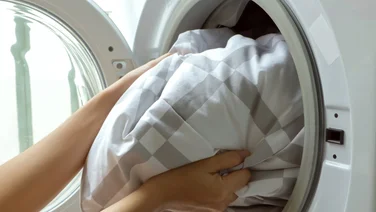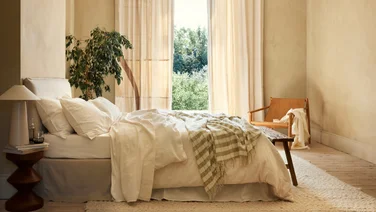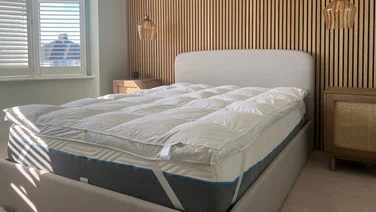To help us provide you with free impartial advice, we may earn a commission if you buy through links on our site. Learn more

Sleep is essential for good mental and physical health. A great night’s shut-eye can help you feel and perform better the next day, and doctors even say you could add years to your life with healthy sleeping patterns. One of the easiest ways to achieve this is to make your bedroom more sleep-friendly.
The ideal sleep environment is much more than just a bed in a room. Temperature and humidity, noise levels, lighting and even furniture arrangements all influence a room’s effectiveness as a place to sleep.
In this article, we’ll explore these and other conditions that can make or break your sleep environment. Then we’ll offer our top tips for ensuring your bedroom is optimised for a good night’s sleep: from the firmness of your mattress to the settings of your alarm clock.
READ NEXT: Best mattresses
Key conditions that impact your sleep environment
Most of us wish we could get more sleep. In our Expert Reviews Sleep Survey, more than three-quarters (77%) of respondents said they would sleep more if they could, and the NHS reports that insomnia affects around one in three people in the UK.
Sleep supplements and strict routines can help, but your bedroom has a huge role to play in helping you sleep better. Here are the most important factors at play in creating the optimal place to sleep.
1. Light
Light and dark are strong cues for your body to wake up or go to sleep. This is largely down to the hormone melatonin, which helps regulate your body’s circadian rhythms and allows you to drift off.It’s widely said that the “blue light” from smartphones and other digital screens can have a negative impact on your sleep. Doomscrolling at bedtime certainly won’t help lull you into a state of relaxation, but recent studies suggest that the blue light effect has been exaggerated.
Nevertheless, exposure to any sort of light in the evening will suppress your body’s production of melatonin. If you want to improve your sleep, banishing light from your bedroom should be strategy number one.
2. Noise
You’re not completely unconscious when you sleep. Your brain is aware enough to respond to loud noise, unexpected noise and even quiet sounds that have personal relevance to you, such as your baby gurgling.
Sleep can be disturbed by noises as low as 30-40 decibels, which is half as loud as street traffic, although people’s sensitivity varies, and your own sensitivity varies throughout the night. When you’re in deep sleep (stage 3, 4 and REM) you’re less likely to be woken by noise.
3. Temperature
Temperature may have an even bigger impact on sleep quality than noise. Our body temperature naturally drops to its lowest level about two hours after we fall asleep, and if the room is too warm to let this happen (around 20°C or more), you won’t get enough “slow wave” deep sleep to feel refreshed when you wake.
Being too cold can keep you awake too, as you’ll know if you’ve ever tried to sleep in a tent. However, we adapt to sleeping in the cold more easily than sleeping in the warm.
4. Smell
The fragrance of your room can have a big impact on your ability to fall asleep, stay asleep and sleep deeply, according to scientists exploring drug-free insomnia treatments. Lavender and chamomile aid sleep, while peppermint can help people feel more awake.
5. Mattress
A comfortable mattress seems like a no-brainer for a good sleep environment, but many of us are sleeping on mattresses that are too soft, too hard or too old for optimal sleep.

The optimal mattress will keep your spine in alignment while you sleep. If you’re a larger person or a back sleeper, your spine and joints need more support than an old or soft mattress can provide. If you’re a small person or a side sleeper, you may need a little extra softness to accommodate your body. The right mattress won’t just enable you to drift off in comfort, it may also soothe back pain.
READ NEXT: Best mattresses for side sleepers
6. Clear the air (literally)
The UK seems to have two seasons: rainy season and hosepipe ban season. Both extremes can interfere with your sleep by making the air too damp and cold, or too dry and hot. In summer, add moisture with a humidifier, which can also cool the air down and help alleviate snoring. In winter, a dehumidifier will make the air feel warmer and more clear.
READ NEXT: Dehumidifiers vs humidifiers: What’s the difference?
7. Cool down the room
Leaving the window open can disrupt the quiet you need for comfortable sleep, and the same goes for air conditioners, which work a treat to cool the air down but can be noisy. If white noise helps you sleep you may not mind, but it’s worth knowing that the AEG ChillFlex Pro portable air conditioner (£580) has a particularly quiet setting.
Air cooling units are cheaper, at around £100, as are electric fans. Check out our rundown of the best quiet bedroom fans that cool you down without making too much noise.

8. Keep your bed cool…
Cheap polyester duvets and bedding can trap heat and make it harder to sleep. For the summer months, try switching to a lightweight 4.5 tog (or less) duvet, or even a fine cotton sheet. Cotton is more breathable and absorbs moisture, so you don’t feel clammy.
Some of the best hybrid mattresses have layers designed to help keep you cool and dry at night. The Simba Hybrid Pro has a comfort layer of wool (which is known to be an excellent material when it comes to temperature regulation), while the Emma NextGen Premium has a removable cover that wicks sweat away from your body.
READ NEXT: Best firm mattresses
9. …or warm it up
An electric blanket is an efficient and affordable way to add warmth, and an ideal option if you don’t like being weighed down by heavy blankets or duvets. Today’s best electric blankets are thin, light and efficient, and safe to leave on all night.
10. Look for a mattress with good motion isolation
If you share your bed with a restless partner but your budget can’t stretch to a super king size mattress, “motion isolation” is your friend. Simply put, this refers to how a mattress can limit the disturbance caused by motion transfer (such as a person tossing and turning). Mattresses that have good motion isolation qualities ensure that movement on one side of the mattress won’t be felt on the other, and are a particularly good option for couples.
Mattresses with excellent motion isolation include the Emma NextGen Premium, the HiGrid Premium Hybrid and the Origin Hybrid.
11. Transform an old or hard mattress
Mattress toppers are thinner and cheaper than a whole new mattress, but they can help make a hard, old or lumpy mattress much more comfortable. Our favourite mattress toppers include the Panda Bamboo topper, which adds a 5cm layer of foam comfort to your mattress. Its bamboo infused cover material may even help to prevent overheating on summer nights.
While mattress toppers can help to revive a tired old mattress, they won’t work miracles and it’s still important to recognise when you might need a new mattress altogether.
READ NEXT: Best mattress toppers
12. Find your ideal pillow
Pillows come in many shapes, sizes and types, and finding the right one for you can help you sleep better and wake up pain-free. Our article on the best pillows you can buy explores a range of pillows for different types of sleepers, from contoured memory foam and super-soft down to hypoallergenic latex.
13. Wake up naturally to light
A smartphone has no place in the ideal sleep environment. In an ideal world, we’d all have blackout curtains that automatically open slowly and silently at your desired time. The next best thing is a sunrise alarm clock, a few of which we included in our round-up of the best alarm clocks. For example, the Lumie Sunrise Alarm (£42) mimics natural sunlight and gradually increases its brightness to rouse you gently from your slumber.






